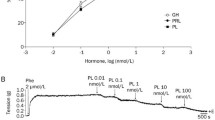Abstract
Bradykinin (BK), a nonapeptide derived from kininogen, is involved in a variety of biological processes including inflammation, regulation of blood pressure and fluid and electrolyte balance (Reviewed in Ref. 1). BK induces a profound hypotensive. effect in vivo and dilates the arterioles and constricts veins in vitro. From the pharmacological experiments using isolated strips of blood vessels, uterus and intestine, it has been shown that BK exerts its effects by interacting with two different types of receptors for BK, ie. B1 receptors such as in rabbit aorta, and B2 receptors such as in cat ileum and rat uterus3).
Access this chapter
Tax calculation will be finalised at checkout
Purchases are for personal use only
Preview
Unable to display preview. Download preview PDF.
Similar content being viewed by others
References
Regoli, D., and Barabe, J., Pharmacolev 32, 1 (1980).
Regoli, D., Barabe, J., and Park, W.K. Can Physiol Pharmacol 55, 855 (1977).
Barabe, J., Drouin, J.-N., Regoli, D., and Park, W.K. Can Physiol Pharmacol 55, 1270 (1977).
Odya, CE., Goodfriend, T.L., and Pena, C. Biochem harmacol 29, 175 (1980).
Innis, R.B., Manning, D.C., Stewart, J.M., and Snyder, S.H. Proc atl Acad Sci USA 75, 2630 (1981).
Manning, D.C., Snyder, S.H., Kachur, J.F., Miller, R.J., and Field, M. Nature 299, 256 (1982).
Roscher, A.A., Manganiello, V.C., Jelsema, C.L., and Moss, J. J. lin Invest 72, 626 (1983).
Hirata, Y., Tomita, M., Yoshimi, H., and Ikeda, M. Biochem Biophys Res ommun 125, 562 (1984).
Haigler, H.T., Maxfield, F.R., Willingham, M.C., and Pastan, I. J. iol Chem 255, 1239 (1980).
Hirata, Y., Takata, S., Tomita, M., and Takaichi, S. Biochem iophys Res Commun 132 976 (1985).
Johnson, A.R., and Erdös, E.G. J. lin Invest 59, 684 (1977).
Barabe, J., Babiuk, C., and Regoli, D. Can Physiol Pharmacol 60, 1551 (1982).
King, A.C., and Cuatrecasas, P. New ngl J. Med 305, 77 (1981).
Author information
Authors and Affiliations
Editor information
Editors and Affiliations
Rights and permissions
Copyright information
© 1989 Plenum Press, New York
About this chapter
Cite this chapter
Hirata, Y., Takata, S., Takaichi, S. (1989). Specific Binding Sites for Bradykinin and its Degradation Process in Cultured Rat Vascular Smooth Muscle Cells. In: Abe, K., Moriya, H., Fujii, S. (eds) Kinins V. Advances in Experimental Medicine and Biology, vol 247 A. Springer, Boston, MA. https://doi.org/10.1007/978-1-4615-9543-4_63
Download citation
DOI: https://doi.org/10.1007/978-1-4615-9543-4_63
Publisher Name: Springer, Boston, MA
Print ISBN: 978-1-4615-9545-8
Online ISBN: 978-1-4615-9543-4
eBook Packages: Springer Book Archive




